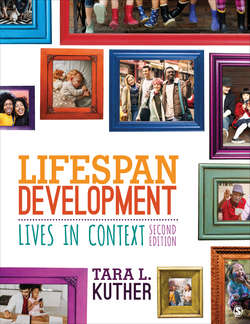Читать книгу Lifespan Development - Tara L. Kuther - Страница 71
На сайте Литреса книга снята с продажи.
Vygotsky’s Sociocultural Theory
ОглавлениеWriting at the same time as Piaget, Russian scholar Lev Vygotsky (1896–1934) offered a different perspective on development that emphasized the importance of culture. As we have discussed on page 8, culture refers to the beliefs, values, customs, and skills of a group; it is a product of people’s interactions in everyday settings (Markus & Kitayama, 2010). Vygotsky’s (1978) sociocultural theory examines how culture is transmitted from one generation to the next through social interaction. Children interact with adults and more experienced peers as they talk, play, and work alongside them. It is through these formal and informal social contacts that children learn about their culture and what it means to belong to it. By participating in cooperative dialogues and receiving guidance from adults and more expert peers, children adopt their culture’s perspectives and practices, learning to think and behave as members of their society (Rogoff, 2016). Over time, they become able to apply these ways of thinking to guide their own actions, thus requiring less assistance from adults and peers (Rogoff, Moore, Correa-Chavez, & Dexter, 2014).
Lev Vygotsky (1896–1934) emphasized the importance of culture in development. Children actively engage their social world, and the social world shapes development by transmitting culturally relevant ways of thinking and acting that guide children’s thought and behavior.
Heritage/Corbis
Vygotsky’s sociocultural theory holds important implications for understanding cognitive development. Like Piaget, Vygotsky emphasized that children actively participate in their development by engaging with the world around them. However, Vygotsky also viewed cognitive development as a social process that relies on interactions with adults, more mature peers, and other members of their culture. Vygotsky also argued that acquiring language is a particularly important milestone for children because it enables them to think in new ways and have more sophisticated dialogues with others, advancing their learning about culturally valued perspectives and activities. We will revisit Vygotsky’s ideas about the roles of culture, language, and thought in Chapter 7.
Vygotsky’s sociocultural theory is an important addition to the field of lifespan human development because it is the first theory to emphasize the role of the cultural context in influencing people’s development throughout life. Critics argue that sociocultural theory overemphasizes the role of context, minimizes the role of individuals in their own development, and neglects the influence of genetic and biological factors (Crain, 2016). Another perspective on development, described next, refocuses attention on the individual in context.
